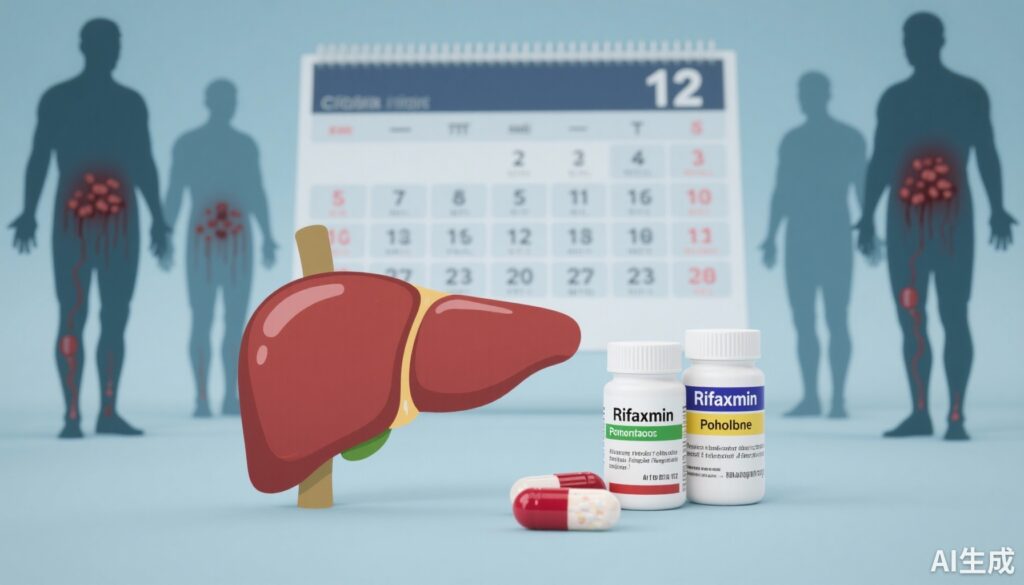Highlight
- Rifaximin did not improve 12-month survival or reduce liver complications in patients with severe cirrhosis and low-protein ascites when used as primary prophylaxis for spontaneous bacterial peritonitis (SBP).
- Adherence to rifaximin was associated with reduced liver-related complications, suggesting the importance of treatment compliance.
- No significant safety concerns were found with rifaximin over 12 months.
- This trial challenges the routine use of rifaximin for primary SBP prophylaxis in this patient population, emphasizing the need for further research and adherence monitoring.
Study Background
Spontaneous bacterial peritonitis (SBP) remains a serious and potentially fatal infection in patients with cirrhosis and ascites, especially in those with severe disease characterized by advanced ascites and low ascitic fluid protein levels. Current guidelines recommend norfloxacin, a fluoroquinolone antibiotic, for secondary prophylaxis of SBP, but primary prophylaxis evidence is limited. Moreover, fluoroquinolone use raises concerns about antimicrobial resistance. Rifaximin, a poorly absorbed, broad-spectrum antibiotic with minimal systemic absorption, is widely used in hepatic encephalopathy due to its favorable safety profile and lower risk of resistance development. Its role as primary prophylaxis for SBP in severe cirrhosis warranted rigorous investigation given the need for effective, safe preventive therapies in this high-risk group.
Study Design
This multicenter, randomized, double-blind, placebo-controlled trial was conducted across 17 centers in France. Eligible patients had severe cirrhosis with grade 2 or 3 ascites and ascitic fluid protein less than 15 g/L, conditions that place them at high risk for SBP. Participants were randomized 1:1 to receive either rifaximin 550 mg twice daily or placebo for 12 months. The primary endpoint was overall survival at 12 months. Secondary endpoints included survival at 3 and 6 months, incidence of liver-related complications (SBP, hepatic encephalopathy, gastrointestinal bleeding, hepatorenal syndrome), and treatment safety.
Key Findings
Of 1957 patients screened, 159 were randomized, and 152 included in the modified intention-to-treat analysis (80 placebo, 72 rifaximin). The 12-month survival rates were 68.1% (placebo) versus 56.6% (rifaximin), with no statistically significant difference (p=0.74). Similarly, no significant differences were observed at 3 and 6 months for survival, nor in the incidence of SBP or other liver complications.
In the per-protocol analysis including 127 patients adherent to treatment, rifaximin recipients showed a significantly lower cumulative incidence of liver-related events over 12 months. This finding suggests that treatment adherence may importantly influence outcomes.
Rifaximin was well tolerated with no notable safety issues recorded during the study, reinforcing its known safety profile.
Expert Commentary
This large, methodologically rigorous trial provides valuable evidence regarding rifaximin’s role in primary SBP prophylaxis. Despite its pharmacological advantages and established efficacy in hepatic encephalopathy, rifaximin did not translate into improved survival or complication reduction in the studied population. The study highlights the complexity of SBP prophylaxis and the difficulty in altering the natural history of severe cirrhosis with antibiotic strategies alone.
The observed benefit in adherent patients underscores that optimal compliance may unlock some clinical advantage. However, adherence challenges are common in this patient group due to factors such as hepatic encephalopathy-related cognitive impairment and polypharmacy.
Limitations include a relatively small randomized cohort compared to screened patients and potential variability in ascites management practices across centers. Additionally, the lack of direct comparison with norfloxacin leaves questions about relative efficacy unanswered. More research is required to explore combination or multimodal approaches and to refine patient selection for prophylaxis.
Conclusion
This trial demonstrates that rifaximin does not improve 12-month survival or reduce key complications when used as primary prophylaxis for SBP in patients with severe cirrhosis and low-protein ascitic fluid. Nonetheless, improved adherence to rifaximin therapy could help reduce liver-related complications. These findings suggest that, at present, rifaximin should not replace current standard preventive strategies for primary SBP prophylaxis. Clinicians should emphasize treatment adherence and consider the broader clinical context when managing these high-risk patients.
Further studies are warranted to explore alternative approaches to SBP prevention, optimized antibiotic stewardship, and strategies to improve patient adherence in severe cirrhosis.
Funding and Clinical Trial Registration
This investigator-initiated trial was conducted by French academic centers and supported by relevant institutional funding. The clinical trial is registered at ClinicalTrials.gov under the identifier NCT03069131.
References
Thévenot T, Elkrief L, Bureau C, et al. Effect of rifaximin in patients with severe cirrhosis and ascites: A randomized double-blind placebo-controlled trial. J Hepatol. 2025 Jul 11:S0168-8278(25)02318-9. doi: 10.1016/j.jhep.2025.06.019. Epub ahead of print. PMID: 40653111.
European Association for the Study of the Liver (EASL) Clinical Practice Guidelines on management of decompensated cirrhosis. J Hepatol. 2018;69(2):406-460.
Ventura-Cots M, et al. Antibiotic prophylaxis strategies to prevent spontaneous bacterial peritonitis: A review. Liver Int. 2022;42(6):1223-1235.



